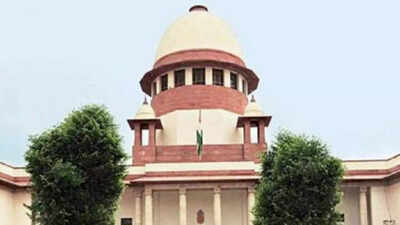Top Searches
- News
- India News
- Supreme Court to examine steps taken by states to curb hate speech
Supreme Court to examine steps taken by states to curb hate speech

NEW DELHI: Holding that states and Union territories are bound to take preventive, remedial and punitive measures to stop hate speeches as per its 2018 verdict, the Supreme Court on Thursday decided to examine what action the states have taken in the past four years to comply with its order in view of the recurrence of several hate speech incidents.
A bench of Justices A M Khanwilkar, Abhay S Oka and J B Pardiwala said that comprehensive guidelines were passed by the apex court in two cases to deal with lynching and mob violence and the problem of hate speeches could be tackled with the implementation of those. The court entrusted the task to the secretary, ministry of home affairs, to compile the information on the status of implementation of those orders by the state governments.
The apex court, in its 2018 verdict, had said that lynching and mob violence were creeping threats to the society, instigated by intolerance and misinformed by circulation of fake news and false stories.
Regarding preventive measures, the apex court had directed that an SP-rank officer be appointed as ‘nodal officer’ in each district for taking measures to prevent incidents of mob violence and lynching and a special task force be created to procure intelligence reports about the people who are likely to commit such crimes or who are involved in spreading hate speeches, provocative statements and fake news. It had also said that FIR be lodged immediately against persons who disseminate irresponsible and explosive messages and videos having content which is likely to incite mob violence and lynching of any kind.
On remedial measures, the Supreme Court had directed all states and UTs to prepare a lynching/mob violence victim compensation scheme within one month from the date of this judgment. It had also directed that the cases of lynching and mob violence shall be specifically tried by designated courts/fast track courts on a day-to-day basis and said that the trial court must ordinarily award maximum sentence to convicts to send a stern message.
On punitive measures, the court had said that police officer who failed to comply with its direction to prevent and/or investigate and/or facilitate expeditious trial of any crime of mob violence and lynching, the same shall be considered as an act of deliberate negligence and misconduct for which departmental action be taken.
The petitioners pointed out that the apex court’s 2018 verdict remained only in book and not implemented on ground, resulting in spiralling of hate speech cases across the country with state governments and the police not taking any action against the accused.
The bench thereafter agreed to examine whether states have put in place the mechanism as directed in 2018 and asked the secretary to file the report within six weeks. It directed that state governments would have to furnish all relevant information of the secretary within two weeks. The court also directed the states to file action-taken reports in hate speech or mob violence cases which are in public domain.
The Supreme Court had earlier said that it is the duty of state governments to stop incidents of hate speeches and expressed concern that such cases are happening despite the apex court passing comprehensive guidelines.
A bench of Justices A M Khanwilkar, Abhay S Oka and J B Pardiwala said that comprehensive guidelines were passed by the apex court in two cases to deal with lynching and mob violence and the problem of hate speeches could be tackled with the implementation of those. The court entrusted the task to the secretary, ministry of home affairs, to compile the information on the status of implementation of those orders by the state governments.
The apex court, in its 2018 verdict, had said that lynching and mob violence were creeping threats to the society, instigated by intolerance and misinformed by circulation of fake news and false stories.
Regarding preventive measures, the apex court had directed that an SP-rank officer be appointed as ‘nodal officer’ in each district for taking measures to prevent incidents of mob violence and lynching and a special task force be created to procure intelligence reports about the people who are likely to commit such crimes or who are involved in spreading hate speeches, provocative statements and fake news. It had also said that FIR be lodged immediately against persons who disseminate irresponsible and explosive messages and videos having content which is likely to incite mob violence and lynching of any kind.
On remedial measures, the Supreme Court had directed all states and UTs to prepare a lynching/mob violence victim compensation scheme within one month from the date of this judgment. It had also directed that the cases of lynching and mob violence shall be specifically tried by designated courts/fast track courts on a day-to-day basis and said that the trial court must ordinarily award maximum sentence to convicts to send a stern message.
On punitive measures, the court had said that police officer who failed to comply with its direction to prevent and/or investigate and/or facilitate expeditious trial of any crime of mob violence and lynching, the same shall be considered as an act of deliberate negligence and misconduct for which departmental action be taken.
The petitioners pointed out that the apex court’s 2018 verdict remained only in book and not implemented on ground, resulting in spiralling of hate speech cases across the country with state governments and the police not taking any action against the accused.
The bench thereafter agreed to examine whether states have put in place the mechanism as directed in 2018 and asked the secretary to file the report within six weeks. It directed that state governments would have to furnish all relevant information of the secretary within two weeks. The court also directed the states to file action-taken reports in hate speech or mob violence cases which are in public domain.
The Supreme Court had earlier said that it is the duty of state governments to stop incidents of hate speeches and expressed concern that such cases are happening despite the apex court passing comprehensive guidelines.
FOLLOW US ON SOCIAL MEDIA
FacebookTwitterInstagramKOO APPYOUTUBE
Start a Conversation
end of article










